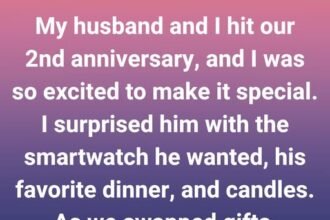When I first met Robert, he was still mourning the loss of his first wife, Lydia. Everyone in our small town knew their story — high school sweethearts who built a life together, had a son named Oliver, and then lost it all when Lydia passed away unexpectedly in a car accident. When I entered the picture, two years later, I didn’t expect to replace her.
I just wanted to be part of a new beginning. Robert was charming, attentive, and vulnerable in a way that made me feel needed. He used to tell me, “You make the world feel bearable again.”
I believed him.
We got married quietly, in a garden behind the local chapel, with only close friends and family in attendance. I moved into the house he’d shared with Lydia. At first, it felt strange — her photos still hung in the hallway, her handwriting was on the labels in the pantry, and her perfume lingered faintly in the master bedroom.
Robert insisted on keeping those things “for Oliver’s sake.” I didn’t argue. I understood grief. I told myself that love wasn’t a competition.
That I didn’t have to be Lydia — I just had to be me. But as time went on, I realized that wasn’t how Robert saw it. The first time I noticed the shift was during dinner one night.
Oliver, who was six at the time, spilled his milk all over the table. I grabbed a towel and started cleaning it up before it soaked into the wood. Robert sighed.
“Lydia never let him eat without a placemat. She always knew how to keep him tidy.”
I froze, towel in hand, unsure how to respond. “I guess I’ll start doing that, then.”
He smiled absently.
“You should. Lydia was very organized — she had this natural way with him. Everything she did made sense.”
He didn’t mean it cruelly, I told myself.
He was reminiscing. But the comparison stung. Over time, those small remarks became constant echoes.
“Lydia made the best spaghetti sauce.” “Lydia never raised her voice.” “Lydia always knew what to say.”
It didn’t matter how much I tried — I was always one step behind a memory. Still, I tried to bridge the distance between us. I packed lunches, helped Oliver with his homework, decorated the house for holidays, and even took a part-time job at the local bakery so I could be home when he got back from school.
But nothing I did ever seemed to measure up. The day it all came crashing down was supposed to be ordinary. A Saturday morning, the kind where the smell of pancakes filled the kitchen and sunlight filtered through the curtains.
Oliver was sitting at the table, building a Lego tower, while I flipped pancakes at the stove. He looked up at me with a hesitant smile. “Can we go to the park today?”
“Of course,” I said, handing him a plate.
“We’ll go after breakfast.”
Robert walked in a moment later, holding his coffee mug. “Actually,” he said, “we can’t. Lydia used to take him to the lake on Saturdays.
It’s kind of their thing.”
I turned to him, confused. “She’s been gone for four years, Robert. We can start new traditions.”
His expression hardened.
The story doesn’t end here — it continues on the next page.
Tap READ MORE to discover the rest 🔎👇





